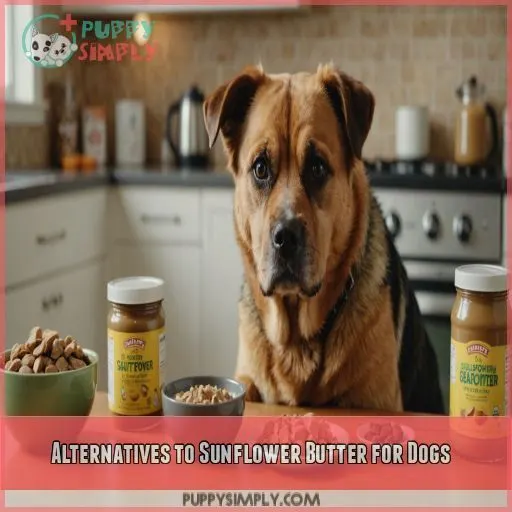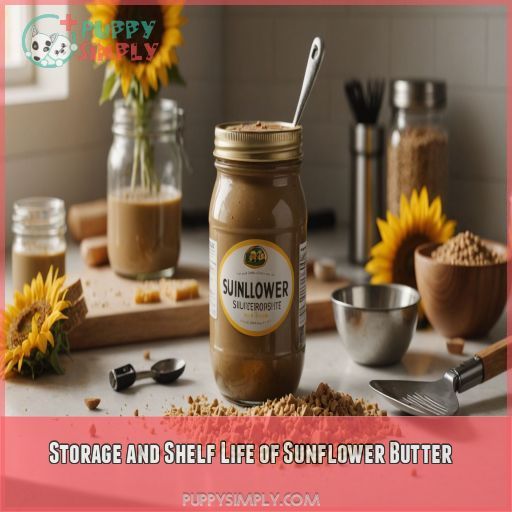This site is supported by our readers. We may earn a commission, at no cost to you, if you purchase through links.
 The eternal quest for tasty treats your furry friend can enjoy safely!
The eternal quest for tasty treats your furry friend can enjoy safely!
If you’re wondering, "can dogs eat sunflower butter," the answer is yes – in moderation, of course!
Sunflower Butter is a great alternative to peanut butter, offering a similar nutty flavor without the common allergens.
Rich in protein, healthy fats, and vitamins, it can be a nutritious addition to your dog’s diet.
Just be sure to choose a xylitol-free and unsalted version, and introduce it in small amounts to prevent digestive upset.
Stick around, and we’ll dig into the benefits, risks, and vet advice to keep your pup happy and healthy!
Table Of Contents
- Key Takeaways
- Can Dogs Eat Sunflower Butter?
- Health Benefits of Sunflower Butter for Dogs
- Sunflower Seed Considerations for Dogs
- Alternatives to Sunflower Butter for Dogs
- Is Sunflower Butter Healthier Than Peanut Butter?
- What to Do if Your Dog Consumes Butter
- Risks and Complications of Feeding Dogs Butter
- Baking and Cooking With Sunflower Butter for Dogs
- Storage and Shelf Life of Sunflower Butter
- Frequently Asked Questions (FAQs)
- Can my dog have sunflower butter?
- What nut butters can dogs eat?
- Is sunflower butter healthier than peanut butter?
- Can a dog eat sunflower seeds?
- Can sunflower butter cause allergic reactions in dogs too?
- How often can dogs safely eat sunflower butter treats?
- Can puppies eat sunflower butter, or is it harmful?
- Is sunflower butter safe for dogs with sensitive stomachs?
- Can dogs eat sunflower butter with other nut butters?
- Conclusion
Key Takeaways
- You can give your dog sunflower butter in moderation – just be sure to choose a xylitol-free version to avoid any toxic scares, and introduce it slowly to prevent digestive upset.
- Sunflower butter is a nutritious treat that’s rich in protein, healthy fats, and vitamins, making it a great alternative to peanut butter for dogs with allergies or sensitivities.
- When shopping for sunflower butter, pick unsalted and unsweetened options to reap the rewards, and always check the ingredient list for any potential allergens or additives.
- If you’re feeling adventurous, you can try baking with sunflower butter using a 1:1 substitution ratio with peanut butter – just remember to reduce the baking soda or add a splash of lemon juice to prevent those pesky green treats.
Can Dogs Eat Sunflower Butter?
You’re probably wondering if it’s safe to share sunflower butter with your furry friend – and the good news is, in moderation, it’s generally okay for dogs to enjoy. However, it’s important to follow some simple guidelines to keep your pup healthy and happy, and that’s exactly what we’ll cover here.
Safety and Moderation Guidelines
When giving your dog sunflower butter, remember: moderation is key. Avoid it if your dog has nut allergies, pancreatitis, or diabetes. Watch out for Xylitol, a toxic ingredient for dogs. Start with small amounts to prevent digestive upset and choking hazards. Store it properly to avoid mold and bacteria contamination, and monitor your dog’s weight to prevent gain.
Nutritional Benefits for Dogs
Now that we’ve covered safety guidelines, let’s explore the nutritional benefits of sunflower butter for your furry friend. Rich in protein, healthy fats, and vitamins, sunflower butter supports a shiny coat, digestive health, and weight management. As a treat or mixed with dog food, it’s a nutritious addition to their diet, promoting overall dog health and well-being.
Allergen-Friendly and Hypoallergenic Properties
SunButter to the Rescue!
If your dog has food allergies, SunButter is a safe treat. It’s free of the top 8 allergens, including peanuts and tree nuts. It’s also gluten and soy-free, so no worries about upset tummies. This makes it a great nut-free option and a healthy, hypoallergenic snack. You can find it at most retailers, making it an easy, peanut-free alternative for your pup.
Health Benefits of Sunflower Butter for Dogs
Wondering if sunflower butter could be a tasty treat for your pup? You’re in the right place. Sunflower butter is a nutritious spread that offers a range of health benefits for your furry friend, from supporting a shiny coat to providing essential vitamins and minerals.
Rich in Protein, Healthy Fats, and Vitamins
Sunflower butter is a nutritional powerhouse for your furry friend, offering a range of benefits:
- It’s loaded with protein, essential for maintaining and repairing body tissues, like muscle, skin, and fur.
- Healthy fats, including omega-3 and omega-6 fatty acids, promote overall health and support a shiny coat.
- Vitamins E and B give your dog energy and keep their nervous system and metabolism in tip-top shape.
- Minerals like magnesium and selenium contribute to bone health and a strong immune system.
Supports Healthy Coat and Skin
A healthy, shiny coat is a sure sign of a happy dog.
Sunflower butter is chock-full of good stuff that supports your dog’s coat and skin health.
It’s got omega-6 fatty acids, which help keep your pup’s coat looking sleek and feeling soft.
Think of it like a natural conditioner, helping to lock in moisture and prevent dryness.
It’s also great for dogs with allergies, as it can soothe itchy skin and promote a healthier coat.
Essential Vitamins and Minerals for Canine Health
Now that we’ve got the coat and skin benefits covered, let’s talk about the essential vitamins and minerals your furry friend needs to thrive. Sunflower butter is a rich source of:
- Vitamin E for healthy skin and coat
- Magnesium for bone health and energy
- Selenium for immune function
- Copper for connective tissue health
- Phosphorus for kidney function and overall well-being
Sunflower Seed Considerations for Dogs
When choosing sunflower seeds for your furry friend, you’ll want to go for unsalted, shelled, and natural options to avoid any potential risks. As a responsible pet owner, it’s also important to keep an eye out for digestive upset in your dog and talk to your veterinarian for advice on adding sunflower seeds to their diet.
Choosing Unsweetened and Unsalted Seeds
Now that you know the health benefits of sunflower butter for your furry friend, let’s talk seeds! When choosing sunflower seeds for dogs, go for unsalted and natural ones to reap the rewards. Pick high-quality seeds from trusted sources to make sure they’re free from contaminants. Your pup will thank you for the extra effort!
Risks of Shell Consumption and Digestive Upset
Sunflower seed shells are a big no-no for your dog’s digestion. Don’t let them munch on shells, as they can cause choking hazards or digestive issues. Stick with shelled sunflower seeds instead. Shell ingestion can lead to gastrointestinal upset, vomiting, diarrhea, or even pancreatitis. Play it safe and stick to shell-free treats for your furry friend.
Consultation With Veterinarian for Personalized Advice
Now that you know the risks of shell consumption and digestive upset, it’s time to get personalized advice from your veterinarian. They’ll help you determine the best way to introduce sunflower seeds into your dog’s diet, considering their breed, health concerns, and specific needs. Your vet will also provide dosage guidance to make sure your pup stays happy and healthy.
Alternatives to Sunflower Butter for Dogs
You’re looking for some alternatives to sunflower butter for your furry friend, and you’re in luck because there are plenty of yummy options available. From peanut butter and almond butter in moderation, to pumpkin puree, yogurt, and bananas, you can mix things up and keep your dog’s tail wagging with these tasty treats.
Peanut Butter and Almond Butter in Moderation
If you’re looking for alternatives to sunflower butter, peanut butter and almond butter can be great options – in moderation, of course! Just be mindful of nut allergies and keep serving sizes small to avoid health risks. As an occasional snack, these butters can add variety to your dog’s treats and homemade snacks.
Pumpkin Puree and Yogurt as Healthy Options
Looking for sunflower butter alternatives? Consider pumpkin puree and yogurt! Pumpkin puree is a fiber-rich, easily digestible treat that can help soothe your dog’s stomach. Yogurt, meanwhile, supports healthy digestion and can be a great base for homemade treats. Just remember to choose plain, unflavored varieties to avoid any potential allergens or additives.
Bananas as a Nutritious Treat
Let’s talk bananas! As a nutritious treat, bananas are a great alternative to sunflower butter for dogs. Rich in potassium, they support healthy digestion and energy levels. Try freezing bananas and blending them into a tasty pup-friendly ice cream. Just remember, moderation is key – too many bananas can lead to an upset tummy.
Is Sunflower Butter Healthier Than Peanut Butter?
You’re probably wondering if sunflower butter is a healthier alternative to peanut butter for your furry friend. Compared to peanut butter, sunflower butter has lower saturated fat content, making it a popular choice among pet owners who want to provide a nutritious treat for their dogs.
Comparison of Nutritional Content
Let’s get down to business and compare the nutritional content of sunflower butter and peanut butter. If you’re anything like me, you want the best for your furry friend. Here’s a snapshot of the two:
- Sunflower butter: rich in protein (7g per 2 tbsp), healthy fats, and vitamin E
- Peanut butter: high in protein (8g per 2 tbsp) and fat content
- Both: good sources of minerals like magnesium and selenium
- Sunflower butter: lower risk of salt toxicosis and lactose intolerance
- Peanut butter: a common allergen, beware of picky eaters!
Lower Saturated Fat Content in Sunflower Butter
Now that we’ve compared the nutritional content, let’s talk about the elephant in the room – saturated fat.
Sunflower butter has one-third less saturated fat than most peanut butters, making it a heart-healthier option for your furry friend.
This is especially important for dogs prone to weight gain or pancreatitis.
With SunButter, you can indulge your pup without worrying about clogging their arteries.
It’s a win-win for their taste buds and their overall health!
What to Do if Your Dog Consumes Butter
If your dog sneaks a lick of sunflower butter or gobbles up a whole jar (no judgments here!), it’s important to know what to do next. Keep a close eye on your furry friend for signs of digestive upset, and be mindful of the fat content in sunflower butter to make sure your dog doesn’t overdo it.
Symptoms to Watch After Ingestion
So, your furry friend got a bit too excited and gobbled up some butter? Keep an eye out for these symptoms:
- Digestive drama: Vomiting, diarrhea, or lethargy can be a sign that your dog’s tummy is doing flips.
- Weight gain worries: Consuming large amounts of butter can lead to weight gain and obesity in dogs.
- Xylitol alert: If the butter contains xylitol, it’s toxic to dogs and requires immediate veterinary attention.
If you notice any of these symptoms, consult your vet for advice on how to help your pup feel better.
Considering the Fat Content in Butter for Dogs
Now that we’ve covered the symptoms to watch after ingestion, let’s talk about the fat content in butter for dogs.
If your furry friend consumes butter, you need to think about the fat content to avoid weight gain and pancreatitis.
As a general rule, dogs need healthy fat sources, but high-fat treats like butter can be detrimental.
Opt for healthier alternatives like sunflower butter, pumpkin puree, or yogurt.
Risks and Complications of Feeding Dogs Butter
As you consider sharing sunflower butter with your furry friend, it’s important to know the potential risks and complications that come with feeding dogs butter. From pancreatitis and digestive issues to weight gain, obesity, and even xylitol toxicity, there are some serious concerns to be aware of before making sunflower butter a regular treat for your dog.
Pancreatitis and Digestive Issues
Your furry friend’s love for sunflower butter can be a double-edged sword. While it’s a tasty treat, overindulgence can lead to pancreatitis, a painful and potentially life-threatening condition. So, go easy on the sunflower butter and monitor for signs of digestive upset, like vomiting or diarrhea. Your dog’s tail (and tummy) will thank you!
Weight Gain and Obesity Risks
To avoid this, keep an eye on portion sizes and balance those calories with regular exercise.
You can also swap sunflower butter with healthier alternatives like pumpkin puree or yogurt.
A balanced diet is key to your pup’s overall health.
Xylitol Toxicity in Sunflower Butter
When shopping for sunflower butter, choose Xylitol-free brands to keep your furry friend safe. SunButter is a great option, as it’s specifically designed with pet safety in mind. Always double-check the ingredients, and never share human food with your dog without checking for Xylitol first. Your pup’s safety is worth the extra precaution.
Baking and Cooking With Sunflower Butter for Dogs
You’re probably excited to get creative in the kitchen and whip up some tasty treats for your furry friend using sunflower butter. Before you start baking, let’s cover the basics of substituting sunflower butter for peanut butter and some key considerations for safe storage and handling.
Substitution Ratio With Peanut Butter
You’re ready to swap peanut butter for sunflower butter in your dog’s treats. The good news is that you can use a 1:1 substitution ratio in most recipes. Here are some tips to keep in mind:
- When baking, reduce baking soda or powder by one-third to prevent green-tinged goodies.
- Add a splash of lemon juice to prevent that pesky green color.
- Sunflower butter has a similar consistency to peanut butter, making it a seamless swap in most recipes.
Considerations for Baking and Storage
When baking with sunflower butter for your furry friend, keep in mind that it can react with baking soda, causing a funky green color.
To avoid this, reduce baking soda by one-third or add a splash of lemon juice.
Store sunflower butter in a cool, dry place to prevent mold growth and maintain its shelf life of one year.
Be mindful of storage temperature, as it can affect the butter’s consistency and quality.
Happy baking for your pup!
Storage and Shelf Life of Sunflower Butter
You’ve learned about the benefits and safety guidelines for sharing sunflower butter with your furry friend, but now it’s time to think about how to keep it fresh and safe for consumption. Proper storage and understanding the shelf life of sunflower butter are really important to maintaining its nutritional value and avoiding any potential health risks for your dog.
Cool, Dry Storage Recommendations
Storing sunflower butter properly is key to keeping it fresh and safe for your furry friend. Choose a cool, dry spot, like a pantry or cupboard. Avoid humid areas, like the kitchen counter or near a dishwasher. Use airtight containers, like glass jars or plastic tubs, to prevent moisture and pests from getting in. Your pup will thank you!
Shelf Life of One Year From Date of Manufacture
When you’re giving sunflower butter to your furry friend, you want to make sure it’s not stale or spoiled. Check the label for the "Best By" date, which is usually one year from the date of manufacture. Here are three storage tips to keep in mind:
- Expiration date: One year from the date of manufacture.
- Storage warning: Keep it away from heat sources and direct sunlight.
- Homemade butter: If you make your own sunflower butter, use it within a few months.
Refrigeration and Freshness Maintenance
To keep sunflower butter fresh for your furry friend, store it in the fridge. This will slow down oil separation and prevent mold growth. You can also freeze it for up to a year. Check the table below for storage tips:
| Storage Method | Shelf Life | Tips |
|---|---|---|
| Room Temperature | 1 year from manufacture | Store in a cool, dry place |
| Fridge | Up to 6 months | Keep away from strong-smelling foods |
| Freezer | Up to 1 year | Use an airtight container or freezer bag |
| After Opening | 3-6 months | Check for mold and oil separation |
Frequently Asked Questions (FAQs)
Can my dog have sunflower butter?
Hold the phone, dog parent! Sunflower butter is generally safe for your furry friend in moderation, but make sure to choose a xylitol-free version and introduce it slowly to avoid digestive upset.
What nut butters can dogs eat?
Considering nut butters for your furry friend? You’ve got options! Peanut butter and almond butter are safe in moderation, but beware of nut allergies. Sunflower butter‘s a great alternative, and pumpkin puree’s a tasty, allergy-friendly option too!
Is sunflower butter healthier than peanut butter?
Think of sunflower butter as the superhero sidekick to peanut butter – it’s a healthier alternative with one-third less saturated fat! For you, that means a guilt-free snack, but what about for your furry friend?
Can a dog eat sunflower seeds?
You can give your dog sunflower seeds, but make sure they’re unsalted and shelled to avoid digestive upset. Start with small amounts and monitor their reaction, and always consult your vet for personalized advice.
Can sunflower butter cause allergic reactions in dogs too?
Did you know that over 1 in 5 dogs suffer from allergies? Now, about sunflower butter: while it’s generally safe for dogs, some may still experience allergic reactions, so monitor your furry friend’s behavior and consult your vet.
How often can dogs safely eat sunflower butter treats?
If you’re thinking about giving your dog sunflower butter treats, you can safely do so in moderation, about 1-2 times a week, as long as you’re not overdoing it and your dog doesn’t have any allergies or sensitivities.
Can puppies eat sunflower butter, or is it harmful?
If you’re wondering about puppies and sunflower butter, the good news is that it’s generally safe in moderation – just be sure to choose a xylitol-free version and introduce it slowly to prevent digestive upset.
Is sunflower butter safe for dogs with sensitive stomachs?
Imagine your furry friend’s tail wagging with joy! If your dog has a sensitive stomach, approach sunflower butter with caution. Start with tiny amounts to test their tolerance, and always choose xylitol-free and mold-free options.
Can dogs eat sunflower butter with other nut butters?
You’re wondering if you can mix sunflower butter with other nut butters for your furry friend? Generally, it’s safe to combine sunflower butter with peanut butter or almond butter in moderation, but always monitor for digestive upset.
Conclusion
Don’t worry, sunflower butter isn’t just a fleeting fad – it’s a nutritious treat that can be a great addition to your dog’s diet!
As you’ve learned, the answer to "can dogs eat sunflower butter" is a resounding yes, in moderation.
Rich in protein, healthy fats, and vitamins, sunflower butter is a tasty alternative to peanut butter.
Just remember to choose xylitol-free and unsalted versions, and always consult with your vet for personalized advice.














